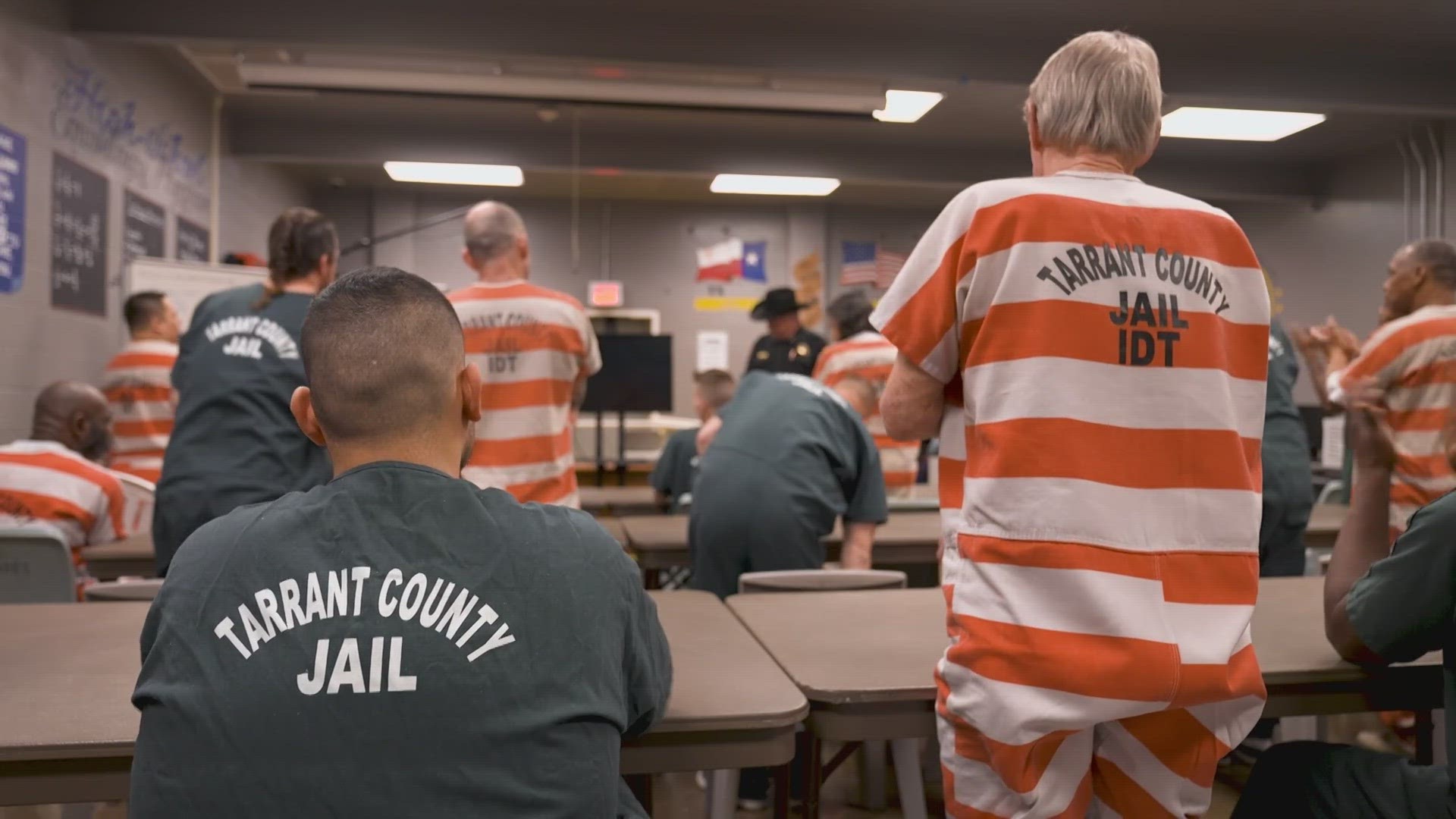TARRANT COUNTY, Texas — At high schools and colleges across North Texas, students put on caps and gowns this May for graduation ceremonies filled with hope and opportunity. In Tarrant County, though, two dozen men completed their graduation ceremony in flip-flops and prison jumpsuits.
Tarrant County’s Green Bay Jail is home to a unique prison reentry program. The 26 men seated in the jail library are half civilian inmates wearing green, and half military veterans wearing orange and white stripes.
The man teaching the group about life and family is a veteran himself who nearly lost both.
Tom Cruz spent 26 years in the US Army and had a top-secret security clearance working as an interrogator in counterintelligence.
“You have a clean slate right now to make your story,” Cruz tells the group. “You guys are going to be taking over my job in a year. You’re the one who’s going to be standing up here.”
In 2010, 15 years into his service, everything nearly ended.
After an argument with his wife, Cruz snapped, writing suicide letters and emails to friends, and barricading her and himself inside their home, planning to take both of their lives with police just outside their door.
“We sat there, and she just listened to me and listened to me,” Cruz said of his wife. “The reason I walked out of that house is because she walked me out of that house.”
Cruz avoided jail time himself. He instead got help at a facility and even kept his security clearance.
“I should’ve been kicked out,” Cruz said. “I was diagnosed with all this stuff, PTSD, anxiety, depression, all this stuff.”
While traveling the world sharing his mental health journey, his name made it to Toni Brinker, the founder of the nonprofit One CommunityUSA, who had an idea for a prison reentry program.
“I am asked to go and expose my story and be vulnerable all over this world,” Cruz told the class. “I live by that it’s OK not to be OK.”
This is the program’s fifth class. Of the roughly 100 inmates who have graduated so far, Cruz says just one has re-offended.
He says he bonds with the men behind bars by sharing his own story of struggle and bringing in guest speakers who have been incarcerated.
“I’m hoping I reach that one,” Cruz said. “If you’ve never been part of the justice system, you do lose hope.
On the front row, Tony Ricks has been in jail for 86 days already and doesn’t have a court date yet.
“I got to the point where I was so sick of who I was,” he said. “I just wanted to find something different.”
He is seated next to Sergio Salazar, a former Army corporal, who has been here one month so far.
“I want to be another successful story,” he said. “My main motivation are my two boys.”
Cruz uses children and family as motivators for the class. During the weeklong class, Cruz and other speakers shared life skills and advice on relationships and careers.
“They just start thinking that they can’t be successful,” Cruz said. “They can’t do better, and then all of a sudden you have people come here and rooting for them.”
Salazar trained dogs in the Army. When he’s eventually released, his dream is to begin a career as a veterinary tech.
“I want to find a career instead of a job,” he said. "I want to do something that I’m proud of.”
The week of the class’s graduation, Ricks missed seeing two of his daughters graduate college.
“I can’t keep doing this,” Ricks said. “I can’t keep abandoning my kids. I can’t. I just can’t.”
His goal is to go to school to become a barber once he’s out of jail.
“If I can cut hair in jail with a comb and a razor, I know I can do some absolutely great things with some clippers in my hands,” he said.
More than anything, the class builds hope in a place where it’s easy to lose.
“They go fill out a job application, and they fail or they don’t get the job,” Cruz said. “Then all of sudden you turn to your vice: drugs, alcohol, whatever because you got one ‘no’. That’s where we step in and say, ‘No, keep pushing them forward, keep pushing them forward.’”
It may be weeks or months before the men in this class are released. On graduation day, though, there’s the same anticipation and excitement for the future that fills any high school auditorium or college quad.
“It’s something my kids can go back and say, ‘My dad did that even though he is where he’s at’,” Ricks said.
“It gives us pretty much everything that we need,” Salazar said. “We just need to put it into action.”
The graduates don’t get special treatment or time off their sentence for completing the course. The diploma they receive is simply a certificate in a folder.
“This was a great experience. I learned a lot,” Ricks said. “I’m going to take that with me everywhere I go.”
The graduation, like any ceremony across the region, still includes tears, handshakes and hugs because the sheet of paper is more than that. It’s proof improvement is possible -- a ticket to a new future and a symbol of hope to hold onto.
“It means a lot a lot. I was actually trying to hold back tears, but I couldn’t fight it,” Salazar said. “We were able to do something positive in what a lot of people consider a negative place.”

